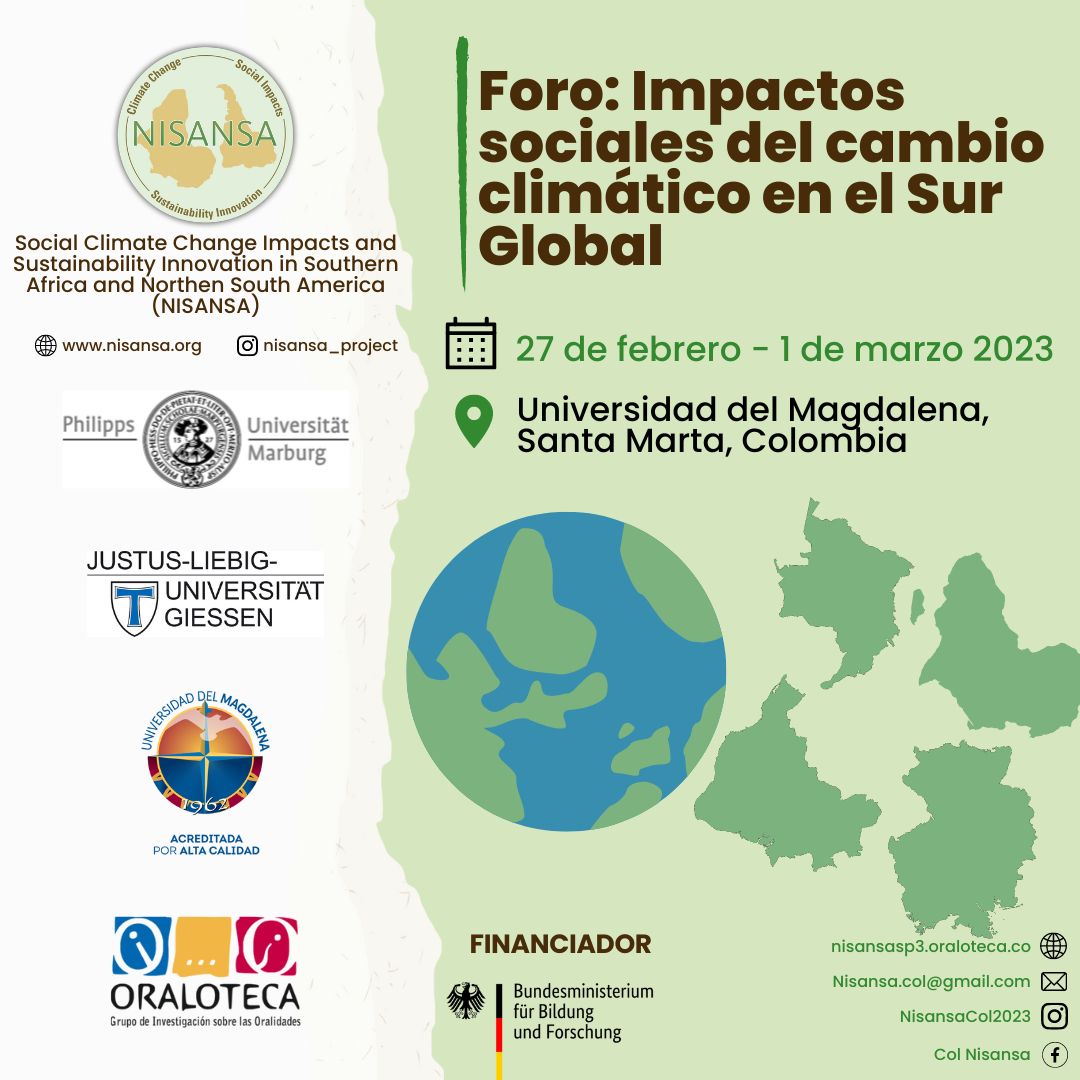PROGRAMMING
Monday, 27.02.23
14:00 – 17:30 PANEL 1: Climate change realities
The plurality of climate knowledge – Anne Goletz y Philipp Naucke (Universidad de Marburg)
 Auditorio Neguanje Lado A
Auditorio Neguanje Lado A
Discussions on climate and climate change are predominantly based on only one form of knowledge: the natural sciences of European origin. According to these, climate is defined as the average weather conditions that characterize a given geographic location. At the same time, there are various forms of climate knowledge. For example, there are conceptions of climate in which the duration of sunshine, the amount of rainfall and wind speed are not only measurable values, but sun, rain and
wind are actors who interact with humans. Or conceptions in which divine powers guarantee humans favorable climatic conditions if they behave properly or punish them with climatic disorders otherwise. To ignore them is to reproduce the (neo)colonial hierarchy of global knowledge production. This panel aims to provide a space for encounter and dialogue between different forms of knowledge about climate. To this end, we bring together people from different regions and communities and distinct academic disciplines and fields of action. Instead of accumulating knowledge about climate by stringing together papers, we want to learn about different forms of knowledge (narratives, songs, etc.) and relate them to each other and to the experiences of all participants of this panel
Climate change, gender and ethnicity – Fabio Silva (Universidad del Magdalena)
 Auditorio Neguanje Lado B
Auditorio Neguanje Lado B
Since climate change is seriously affecting the “harmonies” of the earth caused by humanity against the rest of the planet’s inhabitants, possible solutions must come from all social and cultural groups inhabited. In the case of Colombia, the right to recognize difference has been established since article 7 of the Political Constitution from 1991. Each group that inhabits our territory has the capacity to develop forms of resistance or resilience to counteract Climate Change, as well as to articulate their local knowledge to the possible solutions. In the framework of the Forum: Social Impacts of Climate Change in the Global South, this roundtable seeks to listen to the knowledge and proposals that ethnic groups, women’s movements, peasant associations, women researchers, leaders and the LGBTI community have on this phenomenon. They are probably very light voices in the face of the loud noise of their opponents, but as Kohei Saito writes in “Capital in the Age of the Anthropocene”: “But the time has come to say enough and to say a resounding NO. Let us abandon cynicism. Let’s show them what the 99% are capable of. Key to this is the immediate mobilisation of 3.5% of the world’s population. If this initial movement were to gain momentum, it would break capital, renew democracy and, at least we would have another chance to half level the wide gaps created by capitalism”
From the Global to the local – the Political Economy of Climate Change – Sara Luettich (Universidad de Giessen) – (Starting at 16:00)
(English with Spanish translation)
 Auditorio Playa Grande
Auditorio Playa Grande
The Russian aggression in Ukraine with the resulting geopolitical shifts and a global energy and food crisis once more illustrate that energy transition and climate change are highly (geo)political issues.
Climate change policy can therefore be understood as a terrain of conflict at all levels, from the global to the local (Brunnengräber, 2011). In this «new climate regime» (Latour, 2017), it must also contend with other «new» actors who are no longer bound to national borders in any traditional way.
In the panel, we focus on the political economy of climate change: What is the role of the nation-state, international organisations, economic dynamics, and different actors in a politically and economically globalized and capitalist system? How does climate change alter the (political and economic) constellation of actors from a Global North and South perspective? To what degree does the translation of international climate policies to local levels prove challenging?
Questions about power structures, hegemony, and (in)-justice shall be addressed, as well as the critical discussion about social-ecological transformation against the background of climate change policies.
17:45 – Opening of the photographic exhibition: music/presentation/dance
 Edificio Mar Caribe / Bienestar Universitario
Edificio Mar Caribe / Bienestar Universitario
Tuesday, 28.02.23
8:30 – 10:00 –Plenary Session – Transregional dimensions and evironmental justice– Ernst halbmayer (Universidad de Marburg)
- (Spanish with English translation)
 Virtual /on-site (Click here)
Virtual /on-site (Click here)Please enter your full name
 Auditorio Julio Otero
Auditorio Julio Otero
10:30 – 12:00 – PANEL 2: Strategies and transformations to face the consequences of climate change
Natural solutions to the effects of climate change in Colombian social-ecological systems – Diana Jiménez y Maaike Bader (Universidad de Marburg)
What to do? The diversity of strategies to cope with climate change – Michaela Meurer y Eriko Yamasak (Universidad de Marburg)
Frequently, climate change adaptation projects are designed top-down and oriented towards technical solutions. In doing so, we easily eclipse the diversity of adaptation strategies that local actors develop in their daily routine; we lose sight of the different ways in which these strategies work and of the diverse social dimensions they touch. It is precisely this diversity that is to be the main focus of this panel.
We aim to assemble various examples of how people across the world are preparing themselves against the effects of climate change: may these be practical everyday techniques, such as irrigation systems or a specific architecture; may they be forms of social organisation and cooperation, such as community-based management of natural resources or collective agriculture instead of individual farming. In the process of developing coping strategies for climate change, the exchange of local knowledge, ideas and experiences plays a crucial role. We welcome examples concerning successful knowledge transfer and the synergy emerging form different bodies of knowledge. And finally, local engagements with climate change also include political actions that tackle causes of climate change at national and global levels instead of focusing on adaptation strategies on site. Thus, diverse forms of climate activism driven by local stakeholders form part of the examples to be discussed.
The panel aims at opening up a space to present different strategies and inspire each other. It opens the possibility to reflect on potentials of the presented examples but also to explore their challenges and limitations. We invite both practitioners, who share their own experiences, and academics, who will reflect on coping strategies on an abstract level
-
Sustainability Innovation in Climate Change Pathways – Perspectives and Experiences from different (spatial) Contexts – Simone Strambach y Britta Rennkamp (Universidad de Marburg)
-
(English with Spanish translation)
 virtual / on-site (click here)
virtual / on-site (click here) Code: 024150
-
Please enter your full name
 Auditorio Neguanje Lado B
Auditorio Neguanje Lado B
The proposed panel invites conference participants to interrogate the concept of Sustainability Innovation (SI), to learn and to discuss its meaning within the realities of increasing climate impacts in Colombia and Southern Africa.
Sustainability Innovation can be understood as novelties that address the all three dimensions in people, planet, and profit. The main feature of a SI is its normative directionality, shaped by the purpose for sustainability. An essential difference to economic-technological innovations is the focus on socio-ecological challenges and problems. As a different type of innovation SIs should contribute to a sustainable social transformation, but how does this work in different parts of the world.
Sustainability innovations are a social construct evolving from the interplay of diverse actors in complex and often changing actor constellations, including political actors, civil society, intermediaries, and scientific and market actors with their respective resources, competencies and power potentials. They are oriented toward balancing and considering the mutual ecological, economic, and social needs, interests, and objectives accompanied by conflicting goals and complex negotiation processes.
The panel will firstly, introduce and contextualise SI from diverse perspectives, secondly discuss examples of SI and identify common challenges and benefits of SI in the regions of study.
12:00 – 14:00 – Lunch break
14:00 – 15:30 – Panel continuation
-
16:00 – 17:00 – From Planetary Climate Change and Transnational Politics to Terrestrial Epistemic Practices – Ernst Halbmayer (University of Marburg)
Moving away from the paradox that climate change is an abstract global or planetary phenomenon and at the same time locally specific, I will elaborate transnational and transregional dimensions of climate change and the corresponding transactional epistemologies and politics. Given that the ways of understanding and reacting to climate change are multiple and go beyond transnational adaptation and mitigation policies I will focus on the need to understand, recognise and strive for Terrestrial practices (Latour 2017) as a way of dealing with the consequences of climate change. I will argue that it is necessary to understand the alternatives they offer, the forms of resilience they put in place, and the potentials they generate
17:00-18:00 – Presentation of the documentary «Acuatenientes»
 Sala de proyección La Langosta Azul
Sala de proyección La Langosta Azul
Wednesday, 01.03.23
8:30 – 10:00 – Round table –  Climate change, energy transition and the role of green hydrogen – Stefan Peters (Universidad de Giessen – CAPAZ) en colaboración con TRAJECTS (Transnational Centre for Just Transitions in Energy, Climate & Sustainability)
Climate change, energy transition and the role of green hydrogen – Stefan Peters (Universidad de Giessen – CAPAZ) en colaboración con TRAJECTS (Transnational Centre for Just Transitions in Energy, Climate & Sustainability)
10:30 – 12:00 – PANEL 3: Envisioning sustainable futures – Nadia Combariza y Julia Schwab (Universidad de Giessen)
Post-Fossil Futures: A Workshop
 Auditorio Playa Grande
Auditorio Playa Grande
Climate change and the need for an energy transition: pathways to more sustainability or green extractivism? – Natali Cáceres (Universidad Central del Ecuador)
 Auditorio Neguanje Lado A
Auditorio Neguanje Lado A
Climate change has made the debate on the need for an energy transition inevitable. At the heart of the complex interconnections between these issues is the unifying element of resource exploitation. Both the extraction of fossil resources, which fuel climate change through their combustion, and the extraction of minerals critical to renewable energy systems fuel extractivist dynamics. It remains to be seen whether the shift to renewables represents a sustainable transformation or repeats centuries-old patterns of inequality and injustice. This panel aims to highlight global, national and local tensions related to the extractivist dynamics of the energy transition.
Green Hydrogen as the new extractive? Risks and opportunities of a sustainable and climate-friendly development pathway for Namibia – (Matthias Rompel, GIZ / NISANSA) – (10:30 – 12:00 Colombian time/ 4:30 – 6:00 pm. CET/ 5:30 – 7:00 pm. CAT)
(English with Spanish translation) –
 virtual / on-site (click here)
virtual / on-site (click here)
Code: 024150
Please enter your full name
 Auditorio Neguanje Lado B
Auditorio Neguanje Lado B
A substantial number of developing countries in the Global South are rich in natural resources, and have historically served the global supply for oil, gas and mineral resources. With the climate crisis and a global energy transition, new commodities become important. Green hydrogen seems to be such new commodity, being a potential fuel for the energy transition of many countries.
Given the great potential of solar and wind-energy in Namibia, the country is well-positioned to become a major supplier for green hydrogen globally. And the Namibian government has embarked on harnessing these opportunities. It recently launched a new Green Hydrogen and Derivatives Strategy aimed at delivering up to 12 tons of Green Hydrogen annually by 2050 to world markets.
At the panel the questions will be discussed, how such endeavor can be shaped in a sustainable way, meaning be governed transparently and in the best interest of the people.
